- Home
- Adam Thorpe
No Telling Page 37
No Telling Read online
Page 37
‘A giant rat,’ whispered Christophe.
I felt that we could smash everything down to the ground, farmhouse and all, because it was empty and didn’t really belong to anyone. I wanted to do this, in fact. I couldn’t see very clearly which windows were broken, though. I blinked and realised that it had got much darker outside. I felt really worn out.
We completely miscalculated the time and ended up bicycling in complete darkness with quite a way to go. It had begun to drizzle. We were going so slowly by now that our sweat went cold under our jerseys. We had no lights, and a car nearly ran into us, swerving at the last moment and then stopping a little further on. We bicycled up and the driver, standing by his car, told us off. He asked us if we wanted to be killed, and said that we were completely selfish and had nearly ruined his life. He was wearing a posh, fur-collared coat and made me feel small and stupid.
Christophe explained the situation and the driver nodded and said, in a kinder voice, that he’d give us a lift as far as Châtillon. He couldn’t take our bikes, though. We were cold and exhausted, and could feel the warmth of the car’s inside through the open door. We left the bikes in the ditch at the foot of the trees, hoping they wouldn’t be spotted before we returned in the morning. To get home from Châtillon was no problem: we could phone my parents or catch the evening bus or even walk it.
The car was almost too warm and smelt of washing soda – perhaps from the jacket hanging next to me in the back (Christophe had planted himself in the front). The man gave us a friendly lecture on road safety and told us all about his cycling days as a kid before the war, when you could go for ten kilometres without seeing a car. His car was a luxury model, he said – the new luxury Alfa-Romeo. Christophe knew all about it, and made clever comments that impressed the man. The car had furry red seats and a stereo player in the dashboard which he said ruined his cartridges. He pushed one in and played us some Johnny Hallyday, grinning at us and sliding a knob from side to side to show us the stereophonic effect. Christophe talked about the transistor radio he was getting for his fourteenth birthday in two days’ time. I felt very sleepy as we coasted along. He told us she could hit 200 kilometres an hour without complaining. The yellow beams pierced the night and made it darker still all around, with a swirly mist in the headlights.
The man’s sideburns joined the fur on his coat collar as if they were made of the same material. I guessed he was about my uncle’s age. He was fatter, though, his cheeks shining like money, and I thought how unfair it was that I wasn’t his son. An expensive-looking bottle of cognac lay next to me on the back seat, a red ribbon around its neck. A box of pink tissues rested on the back shelf.
The man kept talking about cars with Christophe, Christophe’s voice not squeaking but low. I vowed to learn all about cars. I pictured the windows of the farmhouse shattering as our voices imitated alien missiles zooming in, and felt embarrassed.
He asked us precisely where we lived and for a moment I thought he would take us all the way to Bagneux, but he never offered. He didn’t know the butcher’s shop. I leaned forward between the seats and described where I lived, mentioning the showroom and the family name on the front.
‘That’s Alain Gobain, vacuum cleaners, isn’t it?’
‘Yes. Industrial vacuum cleaners.’
‘Franchise with Sunburst?’
‘That’s right.’
‘You’re Alain Gobain’s son?’
‘Well … yes. Yeah.’
I couldn’t be bothered explaining about my real father.
‘I see.’
The man was silent for a bit, thoughtful as he drove. Johnny Hallyday moaned on softly about love and missing his girl. Then the man said something I didn’t catch, being in the back, but he glanced round and gave me a sarcastic sort of grin and winked at Christophe.
‘Don’t you think?’ he shouted back.
‘Oh yeah,’ I said, too shy to ask him what he’d said.
‘I won’t tell you my name,’ he added, sounding as if he was going to say more but in the end deciding not to.
Johnny Hallyday started to be sick in the middle of a song and the man swore. He tried to pull the thick cartridge out by hooking it with his finger, the car swerving. Christophe took over and managed to pull the cartridge free, sliding it out bit by bit like a deep drawer with too many socks in. The tape at the other end was hanging out. The man pulled a face and chucked it onto the floor by Christophe’s feet.
‘Eighty minutes of Johnny Hallyday is seventy-five minutes too much,’ he joked. ‘But it’s the principle, isn’t it? We can’t make anything decent any more. Not like the Boche or the Americans.’
He doesn’t care about the cartridge, I thought, he’s got so much money. I’d never met anyone with so much money before.
Blocks of flats and white street lights started appearing and we were suddenly climbing the hill into Châtillon. He deposited us next to a phone box, wished us luck, and drove off with a little show-off burst on the accelerator. I asked Christophe what the man had said in the car after I’d told him my uncle’s name.
‘“I’ll be even with him yet,”’ replied Christophe.
‘That’s what he said, or what you’re saying?’
My chest had gone liquid inside.
‘What he said. Gangster type. You might’ve been kidnapped, Gilles. Tortured and then cut up into tiny pieces and thrown away in a dustbin. Or put into quick-dry cement—’
‘I’ll be even with him yet.’
‘Yeah. Nice of him. Probably a joke,’ Christophe added. ‘He laughed, anyway.’
‘Shit.’
‘Maybe he did the robbery.’
‘Why would he say that, then?’
‘Don’t ask me. Maybe he’s one of the insurance blokes,’ he said.
I’d told Christophe about our problems with the insurance, and he’d said that his father had said that insurance companies take your money and run. I shook my head.
‘Nah, he’s too rich.’
The phone box was broken, a franc piece stuck in the slot.
I had no idea where we were. I’d been into the centre of Châtillon a few times, but always in the day and usually with my mother, so I hadn’t noticed streets or buildings properly. I was embarrassed to admit this in front of Christophe; he followed me past the bright, closed shops thinking I knew where I was going. I had no idea whether there was a bus running through the centre in the evening, or where there was another phone box to be found, or even if we were actually in the proper centre of Châtillon. The shops were all closed.
Then I recognised a chemist’s and took a left turn just after it into a long avenue with big trees. I knew what we could do, now. It was too late to walk home – my mother was probably already panicking.
‘We can phone from here,’ I said, stopping.
‘Who do you know in there? Napoleon’s brother?’
‘It’s my sister’s home,’ I said.
‘What, a nuthouse?’
I ignored him, opening one of the big squeaky gates and trotting between the black hedges towards the front steps. A naked bulb lit the porch.
‘They might think we’re patients,’ Christophe said, coming up behind me.
I could tell he was nervous. This gave me more confidence.
We entered the place without ringing the bell, pushing open the heavy door as if it was our right to visit at any time. There was a ginger-haired nurse behind the desk in the big hallway, who recognised me. She didn’t bat an eyelid when I said, in a strangled little voice I couldn’t improve, that I wanted to see my sister Carole Gobain. She rang through to the ward and said it was fine, we could go straight through, visiting hours had just started. My heart was pounding, remembering what my mother had said about visiting. We visited on Sundays, she’d said, because Carole didn’t have any treatment the day before, and so she was more herself. Perhaps Carole had things sticking out of her, I thought. I started imagining her as a sort of monster, changing into somethin
g human as the treatment wore off.
‘Is it OK?’ Christophe asked, trotting along behind me.
‘It’s OK, OK?’
There were a few patients in the corridors and on the stairs, mumbling or nodding or pretending to be quite normal in a dressing-gown, but otherwise the place felt emptier than in the day. Our footsteps echoed on the stone slabs and I kept thinking of horror films.
‘Can’t we just get home, Gilles?’
‘We can phone from here, you’ll see.’
He was scared, I could tell. So was I. My mother had told me never to visit on my own. We started to go past tall doors with Letraset names of wards pinned to them, mostly the names of flowers: Marguerite, Primevère, Violette. Violette was just before Salle d’Examination which was just before Carole’s ward. The door into the Salle d’Examination was open and I noticed how bright and white this room was.
Carole’s ward was called Ancolie. I showed Christophe the Mel that someone had added in red biro before the name. He nodded nervously, but didn’t smile. I turned the old-fashioned brass knob and opened the door. Faces turned. We recognised her at the far end and she waved as we approached her. She had just had supper and was sipping water in a comfy chair by the end window, where there was a kind of sitting area around a low table. She gave us a big smile, lifting her arms to take my face and kiss it, and then getting slowly to her feet to kiss Christophe. She didn’t look that different. Her hair was a bit untidy, with curls sticking right out behind her ears, but it still looked middle-aged. She had a white cheesecloth top and jeans. I asked her how she was, as my mother always did.
‘I’m very well, thank you,’ she said.
She didn’t seem at all surprised to see us. That was a bit weird.
We all sat. The chairs were modern but already tatty, with sponge showing through small rips and holes. The low table was covered in magazines and a few books. Not all the magazines were religious, although the books mostly had candle flames or clouds on the front. The magazine between us showed Twiggy on the cover, with a shaved head, looking much iller than my sister. I asked her about the supper and she said it was boiled fish again, but very nice, followed by strawberry ice cream which made her teeth hurt. I couldn’t think of anything else to say, for a moment – I had expected her to ask why we were here, but she didn’t. She kept sipping her water, as if she was taking a pill and couldn’t swallow it, blinking nervously all the time. I wondered if this was the effect of her treatment in the morning.
‘We’ve been for a great bike-ride,’ I said.
She nodded sadly. She must feel very trapped, I thought. I couldn’t talk about dishwashers and so on and didn’t want to bring up the crocuses in case she went on about her metal feet and rolled up into a ball again.
‘Where did you go?’
‘Quite a long way, into the country,’ I said.
‘That’s nice.’
‘We found this orange room. In an old farm. Completely orange, even the beams. Top to bottom. It was really weird.’
Carole frowned, looking worried. I felt stupid, talking about such weird, abnormal things, the kind of things you’re supposed to see when on drugs. I tried to think of something ordinary and harmless to talk about, but still couldn’t. I glanced at Christophe. He was sitting crookedly in the chair, his legs looking too long and bony for him.
‘We had a picnic.’
‘Good.’
‘It was very tasty. Christophe’s mum made sausages.’
‘We nearly blacked out,’ said Christophe, his voice coming out in a squeak.
She was frowning at him, now. She probably blacked out every day. Everything we said was wrong. It had been a mistake to come here. My mind had gone blank. I thought about the last few days, to give her the news. My mother always gave her the news, as long as it was harmless.
‘Dad cooked us sardines, but forgot to clean the oven,’ I chuckled. ‘You know, because it stays for days if you don’t, the smell. If you don’t clean it straightaway. Sardines. With Zebo.’
It was hot in the ward, and my forehead was damp. Christophe’s knee was jerking up and down, as if impatient.
‘Zebo,’ said Carole, looking more interested.
‘Yeah, it works really well. Maman did it in time.’
‘You have to do it in time,’ agreed Carole. ‘How’s the dishwasher?’
‘Oh, I think it’s OK, now.’
She said, in her usual slow and slightly slurred way, ‘I told Mum not to overstack. That’s what someone here told me. Never to overstack. You have to be very particular about that. Like the tumble-dryer.’
She looked around, as if afraid to be overheard, or as if looking for the person who had told her. Then she caught Christophe’s eye and smiled broadly at him. He nodded and grinned back, like an ape. I was desperate to leave.
‘They’ve got a phone here, haven’t they? For people to use.’
‘Oh yes,’ Carole said. ‘A very good one. The psychiatrist has got a hairy chest, though.’
‘Really?’
‘And a squint. That’s why he’s a psychiatrist.’
Her voice was slower than on Sundays. That must be the treatment, I thought.
‘Where’s the phone, then?’
‘Why?’
‘Why what?’
‘Why do you want to use it?’
‘Just to phone home,’ I said.
‘What are you going to say?’
‘No, it’s just for us to be picked up. To say we’re in Châtillon. I won’t say I’m phoning from here. I won’t say I’ve been here.’
‘Why not?’
I felt myself going hot and red, panicking.
‘Well, they might not like it, because I didn’t tell them,’ I said.
‘I’m sure they won’t mind. Why should they mind?’
‘I don’t know. It’s not Sunday.’
‘Isn’t it?’
‘No.’
There was a difficult silence, with some of the other patients making funny noises in it. I was rolling the coins in my pocket. Christophe was hunched forward, as if to hide his bony knees. Carole was rubbing her hands together in her lap and looking up at me through the waves of her middle-aged hairstyle. Then I felt something go weird inside me, deep inside my head, like a break in the electric circuit that was put in there by my parents. This is my sister, I thought. Flesh of my flesh. She doesn’t know what day of the week it is, today. She’s flesh of my flesh. We’ve got the same colour eyes: hazel, with green flecks.
‘By the way, I found your old ballet slippers,’ I said.
‘What?’
‘Your old ballet slippers. Remember? They’re definitely yours. You should do ballet again. I really think so.’
A look of panic came into her face.
‘OK, go ahead and phone,’ she said. ‘It’s a very good phone.’
‘Thanks.’
Christophe came with me, obviously not wanting to stay alone with Carole. The phone was on a table by the door; there were instructions typed out above it and a cigarette with a red line through it. You rang through to the nurse at the desk, who then let you ring your number or phone the operator. It was only to be used for urgent calls, or in emergencies. I told the nurse it was urgent, that I had missed the bus home. Eventually I heard my mother’s voice. She sounded anxious.
‘It’s me. Gilles.’
‘Gilles? Oh. Oh thank God. Where on earth are you? What happened? I’ve been so worried. Alain’s phoned the police.’
‘The police?’
‘You promised to be back by dark. Before dark. You haven’t any lights.’
‘We got lost, but we’re now in Châtillon. We got a lift to Châtillon. We left the bikes in a ditch.’
‘You fell in a ditch?’
‘No.’ There were continual crackles, and I could hear faint voices on another line. ‘We left them there. We’re OK. Just late.’
‘Just late? Oh, it’s all right for you, isn’t it? Where are you
phoning from?’
‘Châtillon.’
‘A call-box?’
‘Yes.’
‘I didn’t hear the money go in.’
‘It’s a new type.’
‘Tell us exactly where you are and don’t move. You’re with Christophe?’
‘Of course. Keep calm, Maman.’
‘Thank you. I am as calm as I can be.’ There was a sound like a wave breaking on pebbles, which was probably her sighing into the mouthpiece. The sanatorium mouthpiece smelt of cheap scent and Emmenthal cheese. I heard my uncle’s voice rumbling in the background like faraway thunder. ‘Please tell me where you are, exactly. We don’t want to go wrong. And don’t move from there. That’s when things go wrong in these situations. Please pipe down, Alain.’
I realised that I couldn’t say, that I hadn’t prepared a meeting-point. I didn’t know Châtillon at all well.
‘The main church, in the centre,’ I said, quickly.
‘What does it look like? There’s more than one.’
‘The main one.’
‘How do you know it’s the main one? Describe it. Can you see it?’
‘It’s quite big.’
‘Not modern? Not one of these awful modern things that don’t look like anything at all?’
‘No. It’s old. I think it’s old. It’s too dark to see properly.’
The strange thing is, it was as if I could see it.
‘Don’t move. Especially in the dark. At least you’re in front of God’s house. That makes me feel better.’
‘OK, don’t panic, we are thirteen, Maman. See you in a minute.’
I put the phone down, sighing myself.
‘Difficult,’ said Christophe, grimacing.
‘Yeah. We have to find the main church in Châtillon.’
‘OK.’
We went back to the sitting-room area. Carole was staring at her fingers in her lap.
‘Did you find the loo? It’s a very complicated route.’
‘Yeah.’
‘It’s an excellent toilet.’
‘I have to go now, Carole.’
She looked up at me. Her eyes were shiny with tears.
‘I can’t do anything, Gilles,’ she said.
‘What?’
‘I can’t do anything, I can’t do anything at all,’ she repeated, and spread her hands out in front of her. ‘Look, look at my fingers. They’re all swollen. I can’t do up my hair. I can’t even sew or draw or turn pages. I can’t do anything at all …’

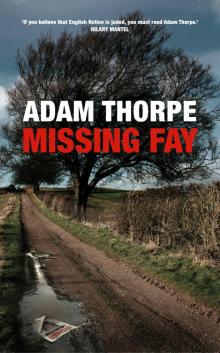 Missing Fay
Missing Fay Hodd
Hodd Pieces of Light
Pieces of Light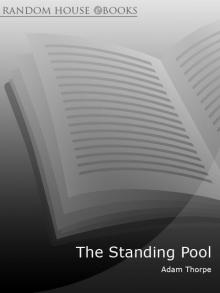 The Standing Pool
The Standing Pool Ulverton
Ulverton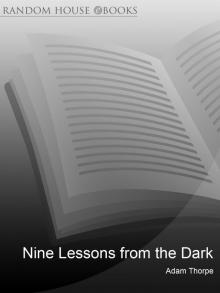 Nine Lessons From the Dark
Nine Lessons From the Dark Flight
Flight The Rules of Perspective
The Rules of Perspective From the Neanderthal
From the Neanderthal Is This the Way You Said?
Is This the Way You Said?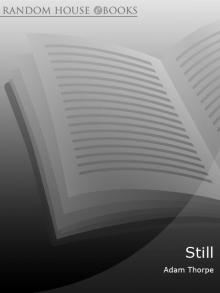 Still
Still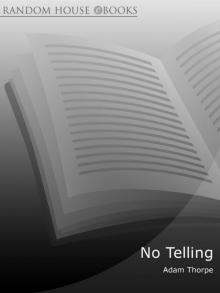 No Telling
No Telling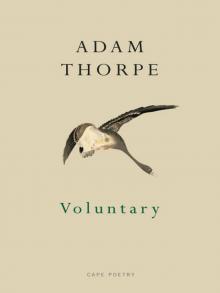 Voluntary
Voluntary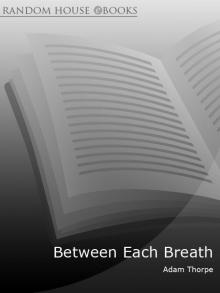 Between Each Breath
Between Each Breath